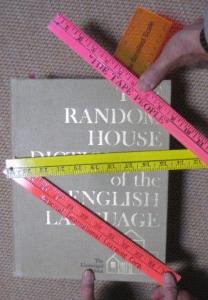Tags
 One of the things that I’ve been thinking about is how much words vary in meaning. I’ve noted that scientists use many fairly common words but mean something different from most people. For example, a scientist typically feels a “theory” is virtually certain. The theory of gravity, for example. Most non-scientists use the word theory for an off-the-wall explanation. “I have a theory about Kennedy’s assassin.” Scientists often use the word “model” to mean a description of the world that works in a wide variety of situations. Not much like the common meaning.
One of the things that I’ve been thinking about is how much words vary in meaning. I’ve noted that scientists use many fairly common words but mean something different from most people. For example, a scientist typically feels a “theory” is virtually certain. The theory of gravity, for example. Most non-scientists use the word theory for an off-the-wall explanation. “I have a theory about Kennedy’s assassin.” Scientists often use the word “model” to mean a description of the world that works in a wide variety of situations. Not much like the common meaning.
Part of the reason this disparity came to mind is an interview on NPR. A New York Times reporter essentially said that Donald Trump cannot lie, because a statement is not a lie if the speaker is unaware of it’s truth. Trump certainly engages his mouth or thumbs long before his brain, and in many cases seems to never think about his remarks. Our tweeter-elect usually only seems concerned in fighting and self-aggrandizement.
The word “lie” struck me as one of those words whose meaning wanders. The Twit-Elect may well be clueless about his remarks, as often suggested, in which case they are not lies in the sense the reporter used. A meaning close to that used by the judicial system, but far from common.
Telling a three-year old not to lie is common for parents of young children, despite the improbability of them knowing the difference between truth and fiction. They are lying in the common sense of the word, but not the legal sense.
 So, as you write, be careful of the spelling of homonyms and homophones and be aware that two characters may use the same word to mean quite different things. A wonderful source of misunderstanding for your protagonist to trip over. Or, paraphrasing Indiana Jones, Truth is for Philosophers. Archaeologists, criminologists and scientists look for facts.
So, as you write, be careful of the spelling of homonyms and homophones and be aware that two characters may use the same word to mean quite different things. A wonderful source of misunderstanding for your protagonist to trip over. Or, paraphrasing Indiana Jones, Truth is for Philosophers. Archaeologists, criminologists and scientists look for facts.
